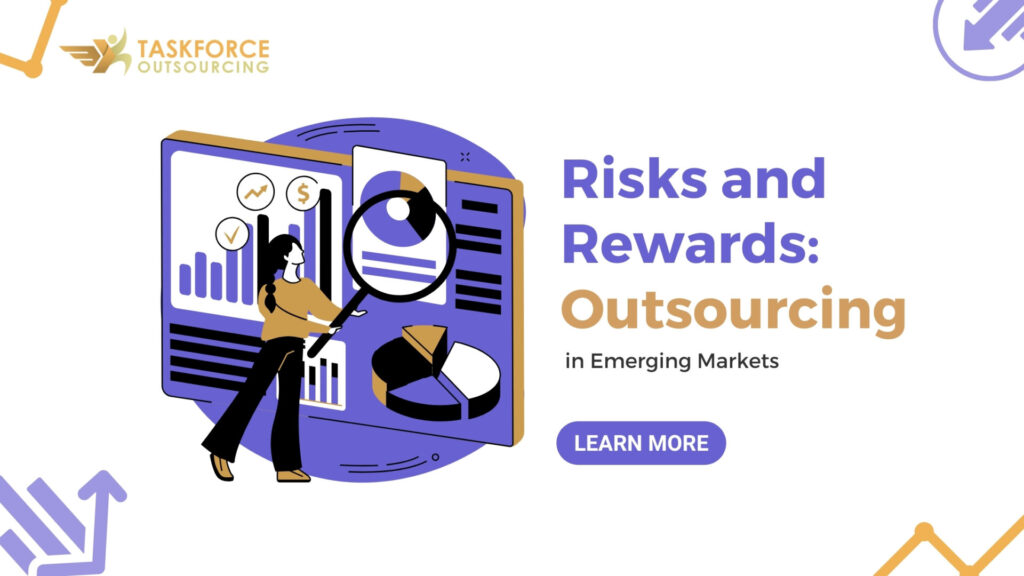The outsourcing of services to emerging markets has become a strategic imperative for companies seeking to increase their productivity and efficiency. In order to successfully navigate the complexities of global business, it is crucial to understand the dynamics of this practice. Here we will discuss the risks and benefits of outsourcing in emerging markets.
Contents
- 1 Understanding Outsourcing in Emerging Markets
- 2 Benefits of Outsourcing in Emerging Markets
- 3 Risks Associated with Outsourcing in Emerging Markets
- 4 Best Practices for Outsourcing in Emerging Markets
- 5 Balancing Risks and Rewards
- 6 Future Trends in Outsourcing and Emerging Markets
- 7 Challenges in Compliance and Regulations
- 8 Environmental and Social Responsibility in Outsourcing
- 9 Preparing for the Unforeseen: Contingency Planning
- 10 Conclusion
Understanding Outsourcing in Emerging Markets
Defining Emerging Markets
Emerging markets encompass economies that exhibit rapid industrialization, growing incomes, and an increasing standard of living. These markets often present unique opportunities for businesses looking to outsource various functions.
Overview of Outsourcing
Outsourcing has become a cornerstone of modern business strategies, revolutionising the way companies operate. At its core, outsourcing involves delegating specific tasks or processes to external partners rather than handling them in-house.

Benefits of Outsourcing in Emerging Markets
Cost Efficiency
One of the primary motivations for outsourcing to emerging markets is the cost advantage. Labour and operational expenses in these regions are often lower than in developed economies.
Access to Skilled Talent
Emerging markets are rich in diverse talent pools. Outsourcing allows companies to tap into these resources, gaining access to specialised skills that may be scarce in their home countries.
Market Expansion Opportunities
Outsourcing can be a strategic entry point for businesses to explore and expand their presence in new markets. Local expertise provided by outsourcing partners can be invaluable.
Risks Associated with Outsourcing in Emerging Markets
Cultural and Communication Challenges
Misunderstandings rooted in cultural and communication differences can strain outsourcing relationships. It's essential for businesses to proactively address these challenges by fostering open communication, providing cultural sensitivity training, and promoting a collaborative work environment.
To overcome cultural and communication barriers, businesses should implement strategies such as regular communication channels, cross-cultural training for teams, and the use of technology to facilitate seamless interaction. Creating a culture of inclusivity and mutual understanding can turn diversity into a strength rather than a potential risk.
Quality Control Issues
Maintaining consistent quality standards can be challenging when outsourcing to diverse markets. Establishing robust quality control measures is essential.
Challenges in Political Stability
Navigating political instability is paramount for businesses outsourcing to emerging markets. Sudden policy changes or political unrest can disrupt operations and jeopardise the stability of outsourcing relationships. It becomes crucial for companies to stay informed, conduct thorough risk assessments, and establish contingency plans to mitigate the impact of political shifts.
Economic Uncertainties
Economic uncertainties, including fluctuations in currency values and inflation rates, pose challenges for businesses engaged in outsourcing. These factors can impact the cost-effectiveness of outsourcing arrangements, potentially eroding the anticipated benefits. Companies must employ strategies such as currency hedging and financial forecasting to navigate these economic risks effectively.
Best Practices for Outsourcing in Emerging Markets
Thorough Market Research
Before venturing into outsourcing, conducting thorough market research is non-negotiable. Understanding the local business environment, market dynamics, and cultural nuances lays the foundation for a successful outsourcing strategy. Market research helps in tailoring outsourcing strategies to align with the specific needs and nuances of the chosen market.
Effective Communication Strategies
Establishing clear channels and protocols fosters collaboration and minimises misunderstandings. Beyond language proficiency, establishing strong communication channels involves creating an environment where team members feel heard and understood.
Risk Mitigation Plans
Being proactive in risk mitigation involves anticipating challenges and having contingency plans in place. This approach minimises the impact of potential issues on project timelines and deliverables.
Balancing Risks and Rewards
Strategic Decision-Making
Companies must approach outsourcing as a strategic decision, weighing the risks against the potential rewards. A well-thought-out strategy is essential.
Long-Term Vision
Outsourcing decisions should align with the company's growth trajectory. Assessing the impact on sustainability involves evaluating how outsourcing contributes to long-term competitiveness and adaptability. While outsourcing can yield immediate cost savings, a long-term vision requires businesses to look beyond short-term benefits. Considering the broader impact on the company's growth and sustainability is essential.
Future Trends in Outsourcing and Emerging Markets
Evolution of Global Workforce
The global workforce is evolving, with remote work and digital collaboration becoming more prevalent. Outsourcing will adapt to these changes.
Technological Advancements
As technology evolves, outsourcing will benefit from advancements such as augmented reality and virtual collaboration tools.
Challenges in Compliance and Regulations
Navigating Legal Frameworks
In terms of complexity and specificity, local regulations vary. These complex frameworks require meticulous attention to detail and expert legal interpretation and implementation. Businesses must navigate legal frameworks to ensure ethical and legal outsourcing practices.
Ensuring Ethical Practices
Ethics and compliance are intertwined. Businesses face the challenge of aligning outsourcing practices with ethical standards, especially when operating in regions with different cultural norms and expectations. These involve treating workers fairly, respecting local cultures, and minimising the environmental impact of operations.
Environmental and Social Responsibility in Outsourcing
Sustainable Outsourcing Practices
Companies should embrace sustainable practices, considering the environmental impact of outsourcing operations.


Corporate Social Responsibility
Demonstrate commitment to social responsibility by engaging in community initiatives and ensuring fair labour practices.
Preparing for the Unforeseen: Contingency Planning
Business Continuity Plans
Develop robust business continuity plans to mitigate the impact of unforeseen events on outsourcing operations.
Flexibility and Adaptability
Maintain flexibility in outsourcing arrangements to adapt to changing market conditions and unforeseen challenges.
Conclusion
Outsourcing in emerging markets offers a myriad of opportunities but comes with inherent risks. Success requires strategic planning, effective communication, and a commitment to ethical practices. As technology evolves and global dynamics shift, businesses must remain agile and adaptable in their outsourcing strategies.
Frequently Asked Questions (FAQs)
A: While cost savings are a significant advantage, factors like political stability and cultural fit also influence the overall effectiveness.
A: Implementing robust data security measures and thoroughly vetting outsourcing partners are key steps in safeguarding sensitive information.
A: Cultural intelligence is crucial in fostering understanding and collaboration, mitigating cultural and communication challenges.
A: Regularly updating knowledge on international regulations, engaging legal experts, and adapting swiftly to changes are essential.
A: Industries like IT, customer support, and manufacturing often find outsourcing to emerging markets advantageous.
Navigating the landscape of outsourcing in emerging markets requires a deep understanding of the risks and rewards. By adopting strategic approaches, businesses can harness the full potential of these markets for mutual growth and success.


